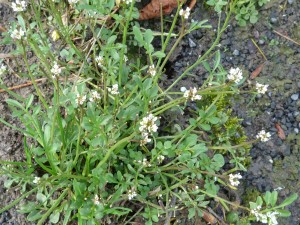Thale Cress
Irish: Tailís
This diminutive plant with it’s very small white flowers is found in waste areas and at the edges of paths around the course.
It is a most unremarkable plant to look at but it has an immensely important worldwide role in scientific research. The advancement of knowledge in plant genetics and the development of ultra-modern and controversial genetic modification (GM) technology is largely derived from research on this humble plant.
A native annual, it grows to about 30cm and bears small (3-4mm across) white flowers on long spindly stalks from March to October. Being a member of the Cruciferous family, the flowers are 4-petalled (cruciform). The seeds are borne in long, slightly curved, siliquae (cylindrical pod-like structures) which spread out from the stalks, arranged in pairs like fishbones.
